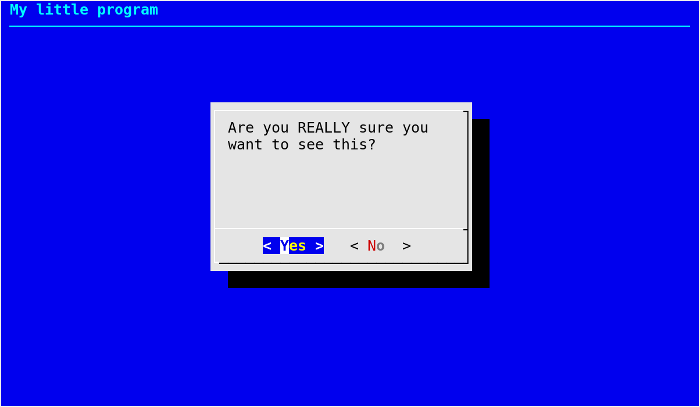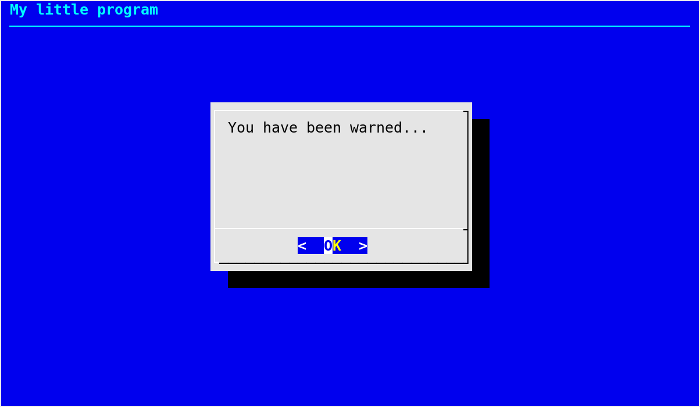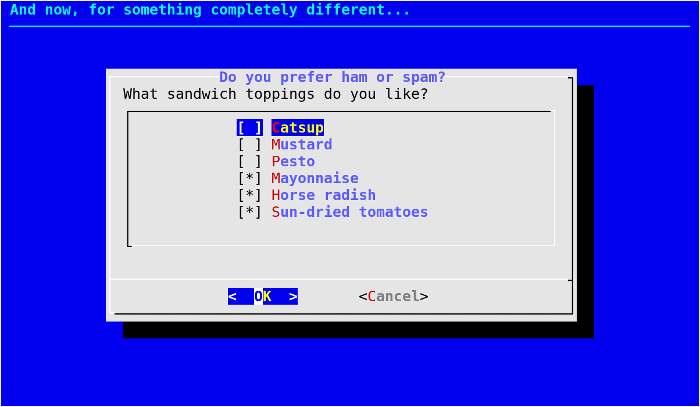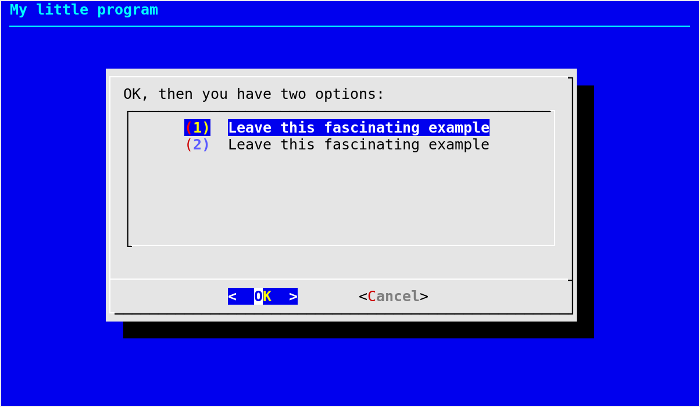pythondialog
.png) pythondialog is a Python wrapper for the
dialog utility originally written by Savio Lam, and later
rewritten by Thomas E. Dickey. Its purpose is to provide an easy to
use, pythonic and comprehensive Python interface to dialog. This
allows one to make simple text-mode user interfaces on Unix-like
systems (including Linux).
pythondialog is a Python wrapper for the
dialog utility originally written by Savio Lam, and later
rewritten by Thomas E. Dickey. Its purpose is to provide an easy to
use, pythonic and comprehensive Python interface to dialog. This
allows one to make simple text-mode user interfaces on Unix-like
systems (including Linux).
Example
The following example is written for pythondialog 3, because it
uses d.OK (attribute of the Dialog class accessed
through the d Dialog instance), which was introduced in
pythondialog 3. If you want it to work with pythondialog 2,
simply replace all occurrences of d.OK
with d.DIALOG_OK.
Note: the (very!) old syntax (d.DIALOG_OK) still works
in pythondialog 3, but is deprecated.
#! /usr/bin/env python3
import locale
from dialog import Dialog
# This is almost always a good thing to do at the beginning of your programs.
locale.setlocale(locale.LC_ALL, '')
# You may want to use 'autowidgetsize=True' here (requires pythondialog >= 3.1)
d = Dialog(dialog="dialog")
# Dialog.set_background_title() requires pythondialog 2.13 or later
d.set_background_title("My little program")
# For older versions, you can use:
# d.add_persistent_args(["--backtitle", "My little program"])
# In pythondialog 3.x, you can compare the return code to d.OK, Dialog.OK or
# "ok" (same object). In pythondialog 2.x, you have to use d.DIALOG_OK, which
# is deprecated since version 3.0.0.
if d.yesno("Are you REALLY sure you want to see this?") == d.OK:
d.msgbox("You have been warned...")
# We could put non-empty items here (not only the tag for each entry)
code, tags = d.checklist("What sandwich toppings do you like?",
choices=[("Catsup", "", False),
("Mustard", "", False),
("Pesto", "", False),
("Mayonnaise", "", True),
("Horse radish","", True),
("Sun-dried tomatoes", "", True)],
title="Do you prefer ham or spam?",
backtitle="And now, for something "
"completely different...")
if code == d.OK:
# 'tags' now contains a list of the toppings chosen by the user
pass
else:
code, tag = d.menu("OK, then you have two options:",
choices=[("(1)", "Leave this fascinating example"),
("(2)", "Leave this fascinating example")])
if code == d.OK:
# 'tag' is now either "(1)" or "(2)"
passwhich gives:
For more examples, see simple_example.py and demo.py in a release tarball.
News
The main changes between the various pythondialog releases are described on the news page.
Installation
- Current pythondialog requires Python 3 and is available on PyPI.
- There used to be a Python 2 backport of pythondialog, but Python 2 has reached its end of life and this backport is not supported anymore. Don't expect any updates or fixes to it.
Debian users: the package containing pythondialog can be installed with:
apt-get install python3-dialog
Other Linux distributions such as Gentoo may also propose pythondialog from their software repositories.
Very old versions that have not been uploaded to PyPI can be found on the SourceForge download page and on Florent Rougon's home page.
Links
Links pertaining to pythondialog:
- PyPI entry for pythondialog (PyPI being the Python Package Index)
- SourceForge download page
- SourceForge project page
- Git repository
- pythondialog Manual rendered by Sphinx
- Mailing list
- Issue tracker (for bug reports, feature requests and patch proposals)
pythondialog relies heavily on these two projects:
History and status
pythondialog was created by Robb Shecter <robb@acm.org> around year 2000, then maintained:
- by Florent Rougon from 2002 to 2004 at his home page;
- by Peter Åstrand from 2004 to 2009 at SourceForge;
- again by Florent Rougon from 2009 to 2013 at his home page and from August 2013 onwards at SourceForge.
Its current maintainer is Florent Rougon.



